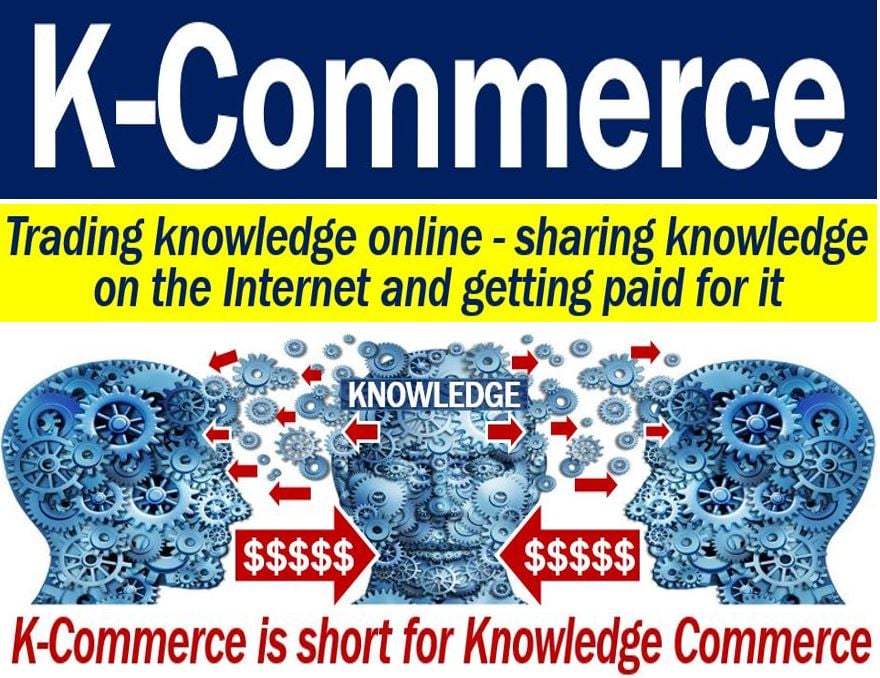K-commerce – definition and meaning
K-Commerce or Knowledge Commerce is the trading of knowledge using electronic networks. By ‘trade,’ we mean buying and selling knowledge. K-Commerce platforms leverage the global reach of the internet, making it possible for experts and professionals to share their insights with a diverse, worldwide audience.
People trade knowledge in many possible forms. In knowledge-based economies, the de-facto currency is knowledge capital. Hence, we have knowledge commerce; the exchange of knowledge or intellectual capital.
Intellectual capital covers a large area. It includes the value of a business and covers its workforce and the value inherent in its relationships. It also includes everything that is left when the workers go home, i.e., structural capital. Intellectual property, i.e., patents, trademarks, slogans, etc., is but one component of this.
Knowledge commerce is similar to any other type of commerce in which people trade tangible products.
However, in this case, people trade knowledge. They trade knowledge mainly using electronic e-commerce platforms, but not always.
Put simply; the term refers to sharing your knowledge online and making money in the process.
Word Finder describes K-commerce as the opportunity to exploit intellectual capital’s intangible value. It also involves distributing that value as a tangible package. Specifically, a tangible package of knowledge-intensive goods or services.
“K-Commerce is the process of turning ‘intangible’ Intellectual capital, into ‘tangible’ (and marketable) knowledge packages,” Word Finder adds.

K-commerce and the knowledge economy
People coined the term ‘k-commerce’ in the age of the knowledge economy. The knowledge economy is the use of knowledge to generate values, i.e., both tangible and intangible values.
Technology, and, especially knowledge technology help to incorporate part of our knowledge into machines.
In an economy where knowledge or know-how rules, it is vital to develop innovative tools to manage knowledge.
We exploit the knowledge we already have by offering consulting services, e-learning, and selling e-books. We also exploit it directly and protect it using our intellectual property laws.
K-commerce platforms often incorporate sophisticated algorithms and artificial intelligence to personalize knowledge delivery and optimize the learning experience for users.
K-commerce also emphasizes the importance of community building, allowing creators and consumers to engage in discussions, feedback, and the co-creation of knowledge content.
K-commerce and e-commerce
E-commerce, which stands for Electronic Commerce, simply means doing business online.
In an Information Systems Management article, R. Kocharekar, from the World Bank, wrote about e-commerce vs. knowledge management.
In an Abstract preceding the main article, Kocharekar explained that there is a synergy between the two.
Knowledge management is all about internal collaborative endeavors. It also involves sharing information and experiences.
K-commerce, on the other hand, is the “collaboration and sharing of knowledge with external **stakeholders.”
** Stakeholders are people who have an interest in a company, i.e., what the company does affects them.
Examples of K-Commerce
Below, there are some examples that reflect ways in which knowledge and educational content can be commercialized and shared online, forming the backbone of K-commerce. We have also included example sentences so that you can see how the term “K-commerce” can be used in context:
-
Online Courses
Digital platforms that offer courses for various skills or knowledge areas, often taught by experts in the field.
Example: “Her success story began when she enrolled in an online course through a K-commerce platform and learned web development.”
-
E-Books
Written materials that are published digitally and can cover a wide range of subjects from academic textbooks to how-to guides.
Example: “He expanded his K-commerce portfolio by publishing an e-book on organic gardening techniques.”
-
Webinars
Live online educational presentations where a speaker shares knowledge on a specific topic, allowing for audience interaction.
Example: “The marketing team’s latest K-commerce initiative included a series of webinars on social media strategies.”
-
Virtual Coaching
Personalized training or mentoring sessions conducted over the internet, providing tailored advice and guidance.
Example: “Through virtual coaching, she’s leveraging K-commerce to help clients achieve their fitness goals remotely.”
-
Knowledge Databases
Online repositories that provide access to specialized information, research, or industry insights.
Example: “Their K-commerce strategy was to offer subscriptions to a knowledge database with exclusive market research reports.”
-
Subscription Learning Platforms
Services that offer access to a library of educational content on a subscription basis.
Example: “As part of his daily routine, he logs onto a subscription learning platform, a key component of the K-commerce ecosystem, to stay updated on digital marketing trends.”
-
Digital Workshops
Interactive sessions conducted online that focus on teaching practical skills or collaborative project-based learning.
Example: “The digital workshop, a popular K-commerce example, allows her to engage with participants in real-time and provide hands-on learning experiences.”
Three Videos
These three YouTube videos come from our sister channel, Marketing Business Network. They explain what the terms “K-Commerce”, “M-Commerce”, and “E-Commerce” mean using easy-to-understand language and examples:
-
What is K-Commerce?
-
What is E-Commerce?
-
What is M-Commerce?

